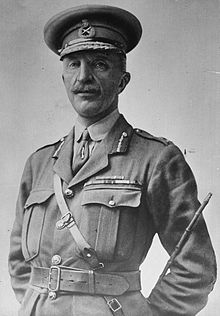
Back هنرى ويلسون ARZ Henry Hughes Wilson German هنری هیوز ویلسون Persian Henry Wilson (sotamarsalkka, 1864–1922) Finnish Henry Hughes Wilson French Henry Wilson Irish הנרי יוז וילסון HE Henry Hughes Wilson ID Henry Hughes Wilson Italian ヘンリー・ヒューズ・ウィルソン Japanese
This article may be too long to read and navigate comfortably. (December 2023) |
Sir Henry Wilson | |
|---|---|
 Field Marshal Sir Henry Wilson, 1st Baronet | |
| Birth name | Henry Hughes Wilson |
| Born | 5 May 1864 Ballinalee, County Longford, Ireland |
| Died | 22 June 1922 (aged 58) Belgravia, London, England |
| Cause of death | Assassination by gunshot |
| Allegiance | United Kingdom |
| Service/ | British Army |
| Years of service | 1882–1922 |
| Rank | Field Marshal |
| Commands held | Chief of the Imperial General Staff Eastern Command IV Corps Staff College, Camberley 9th Provisional Battalion, Rifle Brigade |
| Battles/wars | Third Anglo-Burmese War Second Boer War First World War |
| Awards | Knight Grand Cross of the Order of the Bath Distinguished Service Order Mentioned in Despatches Légion d'honneur (France) Order of Leopold (Belgium) Croix de guerre (Belgium) Order of Chia-Ha (China) Distinguished Service Medal (United States) Order of the White Elephant (Siam) Order of the Rising Sun (Japan) Order of the Redeemer (Greece) |
| Member of Parliament for North Down | |
| In office 21 February 1922 – 22 June 1922 | |
| Preceded by | Thomas Watters Brown |
| Succeeded by | John Simms |
Field Marshal Sir Henry Hughes Wilson, 1st Baronet, GCB, DSO (5 May 1864 – 22 June 1922) was one of the most senior British Army staff officers of the First World War and was briefly an Irish unionist politician.
Wilson served as Commandant of the Staff College, Camberley, and then as Director of Military Operations at the War Office, playing a vital role in drawing up plans to deploy an Expeditionary Force to France in the event of war. He acquired a reputation as a political intriguer for his role in agitating for the introduction of conscription and the Curragh incident of 1914.
As Sub Chief of Staff to the British Expeditionary Force (BEF), Wilson was Sir John French's most important advisor during the 1914 campaign, but his poor relations with Haig and Robertson saw him sidelined from top decision-making in the middle years of the war. He played an important role in Anglo-French military relations in 1915 and – after his only experience of field command as a corps commander in 1916[1] – as an ally of the controversial French General Robert Nivelle in early 1917. Later in 1917 he was informal military advisor to British Prime Minister David Lloyd George, and then British Permanent Military Representative at the Supreme War Council at Versailles. In 1918 Wilson served as Chief of the Imperial General Staff (the professional head of the British Army). He continued to hold this position after the war, a time when the Army was being sharply reduced in size whilst attempting to contain industrial unrest in the UK and nationalist unrest in Mesopotamia and Egypt. He also played an important role in the Irish War of Independence.
After retiring from the army Wilson served briefly as a Member of Parliament, and as security advisor to the Northern Ireland government. He was assassinated by two IRA gunmen in 1922.
- ^ Heathcote, p. 306.
© MMXXIII Rich X Search. We shall prevail. All rights reserved. Rich X Search